- Home
- Jane Peart
Valiant Bride Page 3
Valiant Bride Read online
Page 3
However, when William and Duncan had an opportunity to discuss the situation in private, and Will had suggested that he might consider transferring his marriage offer to Noramary, Duncan had had a most favorable reaction. He told Will he was very pleasantly impressed when he had met Noramary and recalled her as being “a young lady both comely and gracious.”
However, he insisted he would consider such an arrangement only if Noramary herself was willing to receive him as a suitor, and that a proper time of courtship should be maintained in which they could become better acquainted. Then, if mutually agreeable, a wedding could be planned.
“Montrose is a most estimable gentleman,” William told Betsy in conclusion. “Any girl would be lucky to have such a husband.”
Betsy was quick to relay this observation to Noramary, who listened carefully to her aunt’s recitation of all that had transpired between her uncle and Duncan Montrose. And, later, when Duncan sent a formal note asking permission to call on her, she replied affirmatively.
Betsy Barnwell breathed a mental sigh of relief. Everything was working out for the best. Noramary was being dutifully amenable, and in the end she would be grateful. True, she had seemed unduly quiet, almost melancholy, but that was surely due to natural maidenly timidity, Betsy assured herself.
Still, there was something odd in the way Noramary had suddenly refused to see the Stedd boy. Betsy felt sorry for him when she had sent him away, crestfallen. Strange, Betsy puzzled, the two of them had always seemed such good friends, always taking walks together, laughing merrily, finding pleasure in simple activities. Why, surely these children had not been seriously—romantically—involved with each other!
But how absurd, Betsy continued her thoughts. Robert still had his medical training to complete, and he was only a year or so older than Noramary. Both of them were so very young—they had simply been affectionate companions. Marriage could not have been considered so soon. She denied the very possibility, though she had to admit it had crossed her mind.
If this unfortunate thing with Winnie had not happened, Robert Stedd would have been a fine prospect for Noramary. But it had, and that was that. Noramary was being sensible and obedient—and, in the end, she would thank her aunt and uncle for arranging such a prestigious marriage when she had no reason to expect anything half so fortuitous!
chapter
5
THE NEXT FEW WEEKS brought spring in a blaze of beauty to Williamsburg, but for Noramary, moving through her own private grief, the world around her seemed gray and bleak. Hard as she tried to be cheerful, it was an effort to get through each day. At night, her pillow was often wet with the tears she had held back during daytime.
A letter from Winnie finally arrived. In it she begged her parents’ forgiveness for the pain her elopement may have caused them and for any embarrassment resulting from her broken engagement. She went on to assure them of her happiness and health, and asked for their belated blessing. In closing, she sent love to her sisters, naming each, and including Noramary. As the letter was passed around to be read within the family, Noramary could not help the hardening of her heart. Winnie’s own excuses seemed so superficial, considering the havoc and heartbreak her action had left in its wake.
The more Noramary considered it, the stronger was her conclusion that Winnie had used her courtship with Duncan as a foil for her real romance with Philippe Jouquet. She knew her parents would never countenance her marriage to a man ten years her senior, one who had no money to offer except that which he earned. But it was so like Winnie, with her romantic, rebellious imagination, to plunge headlong into such an attachment, the element of danger giving it even greater appeal.
Often in the past Noramary had had to pick up the pieces after one of Winnie’s thoughtless deeds, but never before had there been one with such serious implications.
Now that Winnie was gone, Aunt Betsy’s indefatigable energies were focused upon Noramary, helping her step into the role her daughter had so foolishly abdicated. Duncan Montrose, a man of wealth and power, was too important to lose as a son-in-law, and Betsy was determined that it should not happen. Therefore, on the day Duncan was to pay his first formal call to Noramary, Betsy fluttered about her anxiously.
Tense and pale, Noramary stood in front of the dressing table mirror, tying the drawstrings of her second starched petticoat around her tiny waist.
Noramary was well aware of her aunt’s desire that everything should go well on this first visit and that Noramary should make a favorable impression on Duncan. She herself was apprehensive enough, and Betsy’s fussing over her did nothing to assuage her fears. She tried not to show her irritation, for she sympathized with Betsy’s understandable nervousness. The fact that this meeting was very important was emphasized by Betsy’s insistence that Noramary should have a new dress for the occasion.
“You’re much too thin, Noramary. I don’t think you’ve been eating properly.” Aunt Betsy frowned as she helped fasten Noramary into the bodice of the blue faille. “This dress fit perfectly when we tried it on ten days ago. Now it needs taking in!” she said with a sigh.
Noramary studied her reflection in the mirror, trying to see herself through Duncan’s eyes. If he particularly favored Winnie’s type, he would be disappointed in her, she thought.
Winnie was plump, with doll-like features and flaxen hair. In contrast, Noramary was tall for a girl, wand-slender, with masses of dark hair.
“Blue is certainly your color!” declared Betsy, standing back to admire the effect of the lighter blue overskirt embroidered with forget-me-nots. “Do you need help with your hair?” she asked.
“No, thank you, auntie,” Noramary replied, taking up her brush.
“Then come downstairs when you’re ready, dear. Duncan should be here in a few minutes. I remember him as being very punctual,” Aunt Betsy said as she went out the bedroom door.
Noramary took a deep breath. This meeting would be crucial. She knew how much her aunt and uncle were counting on it to go well. She closed her eyes for a moment and said a little prayer. When she opened them, she regarded herself critically in the mirror. She was pale and thin. She leaned forward and pinched both cheeks to bring some color into them, just as she heard the sound of hoofbeats outside on the cobblestone street. Duncan arriving! She would have to go downstairs now. Aunt Betsy would be annoyed if she kept him waiting.
At the top of the stairs, Noramary paused, hearing the murmur of voices coming from the parlor, recognizing her uncle’s jovial one, Aunt Betsy’s light patter, and a third, deep and resonant, that must be Duncan’s. She strained to hear what was being said.
“In answer to your question, ma’am, the house is nearly completed. I have incorporated some of my own ideas with the plans of the architect my father commissioned. I have some fine artisans among my own people, and they are hard at work on the carpentry and cabinet work. I hope you will see it for yourself when you come as guests to Montclair.”
“From what William told us upon his return from his recent visit, it will be one of the most impressive of all the manor houses built along the James River,” commented Aunt Betsy. “Is that not right, William? Is that not exactly what you said?”
“Indeed it is, my dear!” This from Squire Barnwell, emphatically. “I must say, Duncan, it is a magnificent place!”
Noramary knew they were discussing the house being built on the Montrose land, the home intended for Duncan’s future bride, the mansion to which he had planned to bring Winnie!
Noramary moved quietly down the stairs, still listening as Duncan continued.
“It has been my preoccupation for the past two years, I must admit. That is the reason I haven’t come to Williamsburg more often. I wanted to be sure the house was ready—” His voice broke off and there was an awkward silence. Everyone knew the unspoken ending of his sentence would have been, “by June”—the planned date of his wedding to Winnifred Barnwell.
Graciously, Aunt Betsy shifted the subject
to a more pleasant topic. “And I have always been curious as to the derivation of the name ‘Montclair,’ Duncan. Is it a family name?”
“A combination actually, Mrs. Barnwell,” he replied, “the first half from the first half of our surname; the second, from my mother’s Christian name. Many of the ideas for the house were hers; she made sketches from which our architect drew his plans. Of course, sadly, she didn’t live to see them realized. As you know, she suffered delicate health and never moved to the plantation from our town house. In recent months I’ve been living on the property in the architect’s model, a small cottage on the other side of the creek that runs through the land. Since my sister Janet arrived from Scotland, we have been using that part of the house that’s finished while the rest is being completed. That way, she can oversee the workmen, arrange the furniture—” Again Duncan’s voice trailed away significantly.
Just then Noramary stepped into the doorway and stood there hesitantly. Duncan saw her first, and Aunt Betsy, following his glance, nodded and smiled encouragingly. “Why, here’s our Noramary now! Come in, my dear.”
As Noramary entered the room, Duncan rose and she was again struck by his impressive height. She came forward and curtsied as he took a few steps toward her and bowed over her proffered hand.
Noramary, who before had only regarded Duncan with the natural curiosity given her cousin’s intended, now saw the man from an entirely new perspective. He was impeccably dressed in a tan coat, immaculate white ruffled linen, yellow waistcoat. His russet hair, unpowdered and smoothly groomed, was tied with a brown swallow-tailed grosgrain ribbon.
As she looked up at him, she again noticed the nobility of his features, the steady gaze of clear, gray eyes.
She took a seat beside her aunt on the loveseat opposite Duncan, and the conversation began to flow once more. Noramary observed, with interest, that his manner was genuinely warm and unaffected.
“Montclair is not as isolated as it seemed in earlier days, for many Williamsburg families have built magnificent homes along the river convenient to load their tobacco on barges to take to market. My closest neighbors and good friends are the Camerons, whom you may know.” There was a murmur of assent from the Barnwells. “Although the plantation social season is not quite as lively as in Williamsburg, there is much visiting back and forth and partying, a celebration for any and every occasion.” Here Duncan laughed. “Like most Virginians we planters enjoy good times, and get-togethers are frequent. In winter, the roads do get rather difficult, but then our winters are short.”
Although Duncan’s conversation was directed to her aunt in answer to her questions, Noramary got the feeling he was trying to reassure her that life with him at Montclair would not be a dreary exile.
Uncle William then asked Duncan about his crops and the conversation turned to a discussion of the agricultural and commercial aspects of the plantation. During this business talk, an area Noramary was vaguely aware was of great significance to her future and thus of interest to her uncle, she noticed Aunt Betsy casting glances in her direction as if trying to ascertain her reaction to the prospective suitor.
When Duncan took his leave, he asked if he might call again at the end of the week before returning to Montclair to oversee the spring planting. Aunt Betsy assured him he would be most welcome. As Duncan again bent over Noramary’s hand in farewell, he said, “A pleasure to see you again, Miss Marsh. I shall look forward to our next meeting.”
Thus began a series of well-chaperoned visits signifying a courtship between Duncan and Noramary. Of course, Aunt Betsy was always present on these occasions and often, to Noramary’s acute discomfort, would insist her niece play the harpsichord for Duncan or would point out one of her watercolors or a piece of needlepoint Noramary had completed.
It was during one such episode that Noramary gained an insight into Duncan’s nature that she might never have guessed.
At Aunt Betsy’s insistence, Noramary had agreed to play a new piece she had just learned. Fearing that her memory might fail her, however, she was moving with some reluctance to the harpsichord when she caught Duncan’s sympathetic glance and, at the same time, noticed a twinkle in his eye. It surprised and comforted her to know her prospective husband was a man of consideration and sensitivity, and an answering smile of amusement touched her lips.
Indeed, the more she was with Duncan and the better acquainted with him she became, the more resigned she became to the inevitable outcome of this arrangement. Beyond his courtly and gracious manner was a man of intelligence and wit. She began to admire his forthrightness, and what she had once judged aloofness she now determined to be only an innate reserve. She liked his lack of superficial conversation, his disinterest in gossip. In fact, he had absolutely none of the affectations or airs of some of the young dandies so prevalent in Williamsburg social circles.
Besides these calls in the Barnwell parlor, Duncan had escorted Noramary and her aunt to a musicale and to a supper party hosted by mutual friends and, once, he had even purchased tickets for all the family to attend a play presented by a traveling theatrical troupe, much to the delight of the younger Barnwells.
During the first weeks of summer Duncan called often at the Barnwell house and, in time, Aunt Betsy discreetly withdrew into an adjoining room, leaving the door ajar and Noramary and Duncan to themselves. It was on one such afternoon that Noramary sensed Duncan was struggling to phrase the formal request for her hand. Though Noramary felt they both knew it was a foregone conclusion that she was expected to accept his proposal, she still felt a certain degree of reticence in the tall man she had come appreciate. Perhaps he entertained second thoughts about the agreement. Well, she would give him the opportunity to back out if he so chose.
“It’s such a lovely day, perhaps we should go out to the garden where it’s cooler,” she suggested.
Solemnly, his hands clasped behind his back, Duncan followed her out into the soft balmy air, fragrant with the scent of many flowers. As they strolled along the narrow, gravel paths between the flower beds, Duncan at last broached the subject on both their minds.
“Your aunt and uncle have told me that you would not consider it unthinkable—I mean, if I were to…” Here Duncan paused and made a great show of studying some tulips as if they were a rare, exotic specimen. He suddenly seemed so vulnerable that Noramary felt sorry for this proud man who had been placed in such a position by her cousin.
“I am aware, sir, that you have been approached by my uncle and given permission by him to speak to me… of marriage.”
“I would be honored if you would then consider my proposal… not simply because of the circumstances that have brought it about…” Here he paused, a flush reddening his face.
“I have already given my consent to your suit, and we have their blessing,” she said.
Duncan still seemed to hesitate.
“I am, you know, twelve years your senior, ma’am—a man not too much at ease in society…” Again he paused.
“I am aware of the honor you do me, sir, for I am alone in the world.” Noramary made the statement simply, for she wanted Duncan to know that with his proposal of marriage, he was offering her position, a home, and wealth, none of which she now possessed.
He looked at her solemnly, then said quite humbly, “I am alone, too. And have been for too long.”
They walked a little farther along the flower-bordered path before Duncan spoke again.
“Then you will marry me?”
“Yes, Duncan.” Her answer was so low that he had to bend near to hear it.
Noramary looked past the low garden wall to the meadow beyond, where she had so often walked with Robert. She closed her eyes for a moment. Now that she had promised to marry Duncan, from this day forward she must put all thoughts of Robert out of her mind. There must be no looking back, no regrets. If she made this free choice, she must try to forget what might have been and to accept her life as it was. She thought of the flood of letters from Rober
t, letters she had finally stopped opening, being unable to endure reading his anguished words, letters she dared not answer.
“Are you sure? I would not have you act against your will, Noramary.” There was a thread of anxiety in Duncan’s voice.
Sure? Her thoughts echoed his question. But bow can anyone be sure about anything in life? She had thought hers and Robert’s future was sure. Now, she couldn’t be sure whether what she felt for Robert was true love or merely the yearning to belong to someone.
When she had timidly questioned Aunt Betsy as to whether her lack of romantic feeling for Duncan might be wrong, her aunt had replied briskly, “Of course not, my dear. If the truth be known, most marriages are actually amicable arrangements made for reasons of property or mutual benefit.”
Was Aunt Betsy right? Or was there possibly something more? Noramary remembered vividly that flaming moment in the meadow with Robert when they had kissed for the last time, and the world had stood still. The possibility of what they might have together had trembled between them. Then it was forever lost. Duty had robbed them of knowing the ecstasy that was now beyond their reach. Would pondering “what might have been” haunt Noramary for the rest of her life?
“Noramary?” Duncan’s voice prompted her answer. She blinked as if from the bright sunlight, then clasping her hands tightly together, she took a deep breath and turned back to Duncan. She looked into the face so earnestly waiting for her reply. How strong he seemed, how steadfast.
One could trust that face, believe the message in those eyes, Noramary was certain of it. Perhaps if she could not yet love him—at least not with that rush of fire and excitement she had felt for Robert Stedd—she could at least return that honest affection.
As Noramary met Duncan’s eyes, she realized if she were to accept his proposal, follow the expectations of her aunt and uncle instead of the longing of her heart, it must be done with no mental reservations. It must be done with full knowledge that with her acceptance, she put away the past with all its promise, all its possibilities, and relinquish her dreams of romantic love.

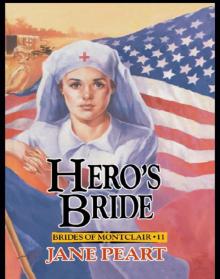 Hero's Bride
Hero's Bride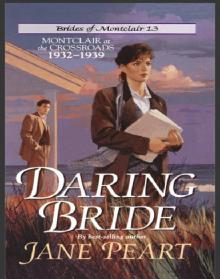 Daring Bride
Daring Bride Runaway Heart
Runaway Heart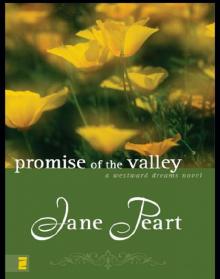 Promise of the Valley
Promise of the Valley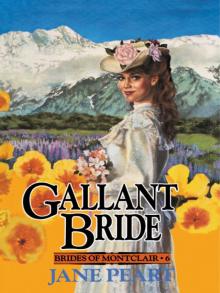 Gallant Bride
Gallant Bride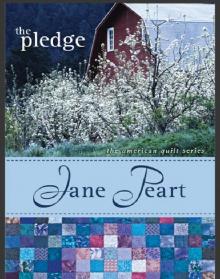 The Pledge, Value
The Pledge, Value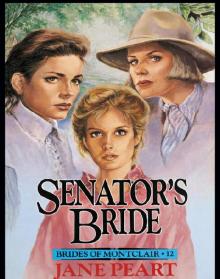 Senator's Bride
Senator's Bride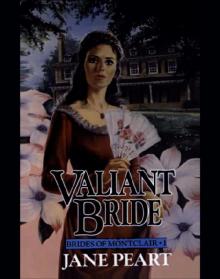 Valiant Bride
Valiant Bride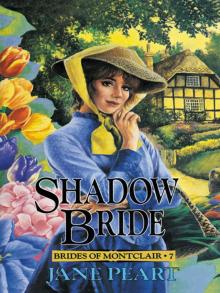 Shadow Bride
Shadow Bride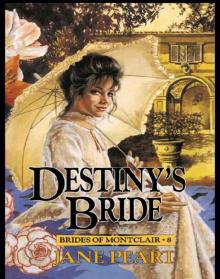 Destiny's Bride
Destiny's Bride A Tangled Web
A Tangled Web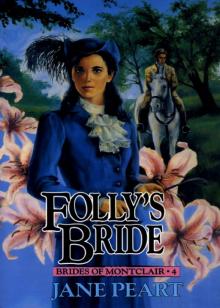 Folly's Bride
Folly's Bride The Promise
The Promise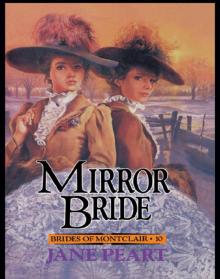 Mirror Bride
Mirror Bride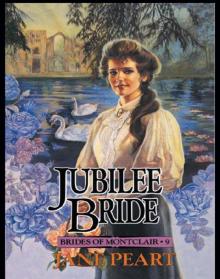 Jubilee Bride
Jubilee Bride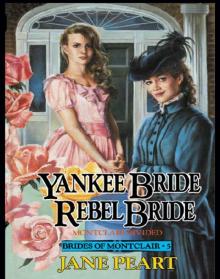 Yankee Bride / Rebel Bride
Yankee Bride / Rebel Bride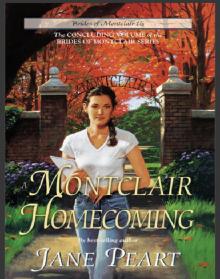 A Montclair Homecoming
A Montclair Homecoming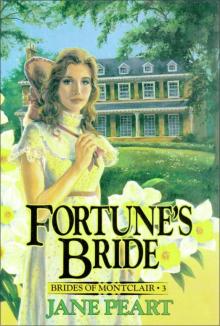 Fortune's Bride
Fortune's Bride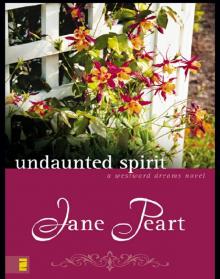 Undaunted Spirit
Undaunted Spirit Love Takes Flight
Love Takes Flight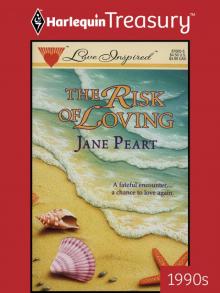 The Risk of Loving
The Risk of Loving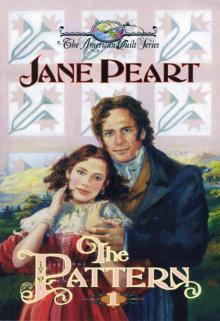 The Pattern
The Pattern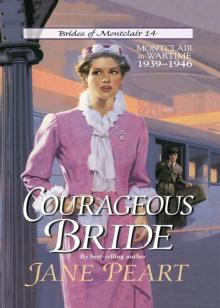 Courageous Bride
Courageous Bride